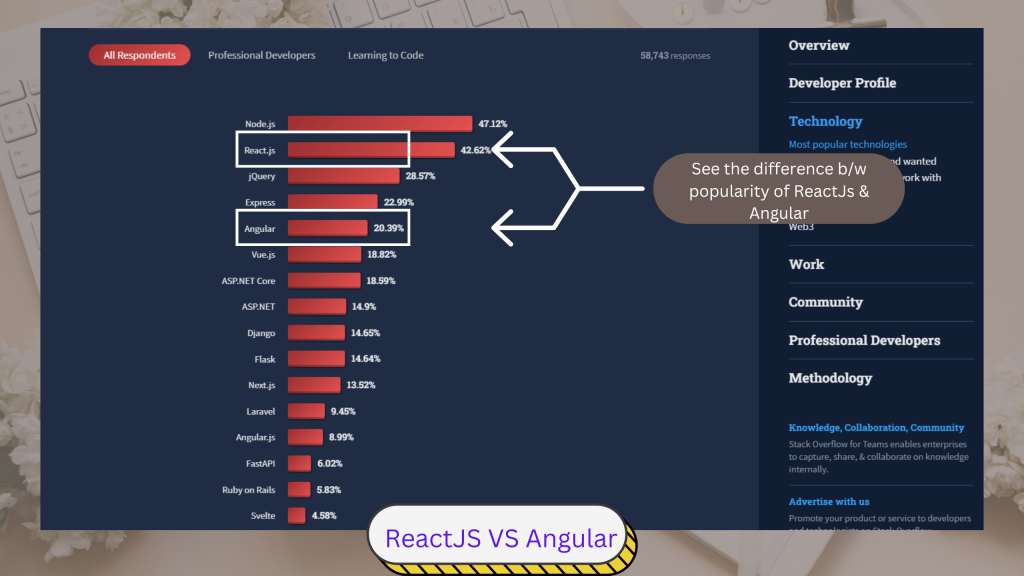ReactJS or Angular: Which is the better in 2023?
The year 2022 is coming to an end and 2023 will arrive soon, and you are looking back to see what front-end frameworks you should have learned that would make you more employable today and in the future as well.
Then JavaScripts frameworks are certainly popular and becoming even more famous now.
So you are trying to choose between two frameworks: ReactJS or Angular.
If you had started learning one of them in 2022, which would be the better choice? In this article, we’ll cover what both frameworks are about in the web development community, review their pros and cons, and predict which one will be more valuable by 2023.
Why Learn ReactJS?
It’s hard to know what new technologies are going to be most important in the upcoming years from now. But ReactJS has a lot going for it.
It’s fast and scalable, which means you can build any application you can dream of with it. Not to mention it’s backed by Facebook, which gives it stability no other technology has.
As a result, ReactJS has established a community and plenty of resources available when you need them. For these reasons, we recommend investing in React now if you plan on building anything more than just a simple website.
Learning ReactJS, however, gives you a broader knowledge of front-end technology. ReactJS can also be used to make native mobile applications as well and has been called by some experts as the JavaScript framework of 2019. That being said, it’s important to take into consideration what you want out of these frameworks before deciding whether one is better than another. If you are looking to have good job security, then I would say react would be more beneficial in that aspect since there are more jobs for those who know how to code using just react.
Why Learn Angular?
The good thing about learning angular at this point is that there are a lot of resources to help you. There are many online courses to take and other tutorials that can teach you the basics. The downside of angular though, is that it has been around for a while now, so there may be some out-of-date material on certain subjects.
On top of that, there are more jobs available for react developers than those who know how to code in both react and angular. That being said, if you want a deeper understanding of how these frameworks work, then I would recommend learning both because they complement each other very well.
If you’re planning on building something on a smaller scale, though—like a web app that doesn’t require intense amounts of scaling—then you could learn Angular.
Angular, which is backed by Google, has similar scalable and fast features to ReactJS. The tooling is excellent and it has one of if not the best developer communities around. If you want to build complex applications but don’t want to go all-in on ReactJS, then look at opting for Angular instead.
It can serve as an effective backend while allowing you to continue using other parts of React if needed.
Angular or ReactJS: Choose one or both?

While Angular is one of the most popular frameworks to use for developing a front-end web app. It has a steep learning curve and can seem overwhelming at times, but it’s worth it.
ReactJS, on the other hand, is easier to learn and offers some advantages over Angular. The biggest advantage that ReactJS offers over Angular is its speed. Since React doesn’t use HTML templates, it doesn’t have to constantly repaint what you see on the screen when changes are made.
Do you wonder what that means? Let me explain.
With Angular, you have to wait for those DOM changes which means waiting for all sorts of things to happen before things appear on your screen. Another thing about ReactJS is that there are many more third-party libraries available for it than for Angular. That makes getting started with something like JavaScript routing really easy and has more functionality available as you go along with development.
There are also fewer ways of doing things with React so you won’t find yourself trying everything under the sun until something works.
Ultimately, the question we’re asking here isn’t whether you should learn either of these, it’s whether you should choose the first Angular or React. The answer to that is that it depends on what you’re doing and what your needs are.
What are other alternatives?
Programming languages like Python, Ruby, and Java can be used to create web apps.
Frameworks like Django, Ruby on Rails, and Spring Boot are popular choices that developers use to build applications with these languages. These frameworks provide a set of tools including templates and scaffolding to help you start building an app. Developers can also use frameworks like React or Angular to build web apps with JavaScript as we discussed.
If you want something more flexible than a framework but still want some guidance, there are many online tutorials to help you learn how to code JavaScript by building projects.
If you already know how to build websites and want to add JavaScript development to your repertoire, a good place to start would be Be Problem Solver. This website offers free coding tutorials that you can complete at your own pace. But remember in coding, we must practice learning anything from free resources like building interactive projects and doing code challenges.
These services make it easy to learn at home without attending classes or spending money on books. If you want an alternative language, then Python may be a good option if you want something similar but different from JavaScript.
Conclusion
So which one you will choose ReactJS or Angular?
The answer to this question comes down to how long you plan on being involved with web development and what you want to do. If you’re looking for a career change, then React may be the way to go. It’s an easier framework to learn and it has great documentation.
On the other hand, if you are just looking to create a small app or website for fun and don’t have any plans of making web development your full-time job, then Angular may be the best choice as it offers more features out of the box.





